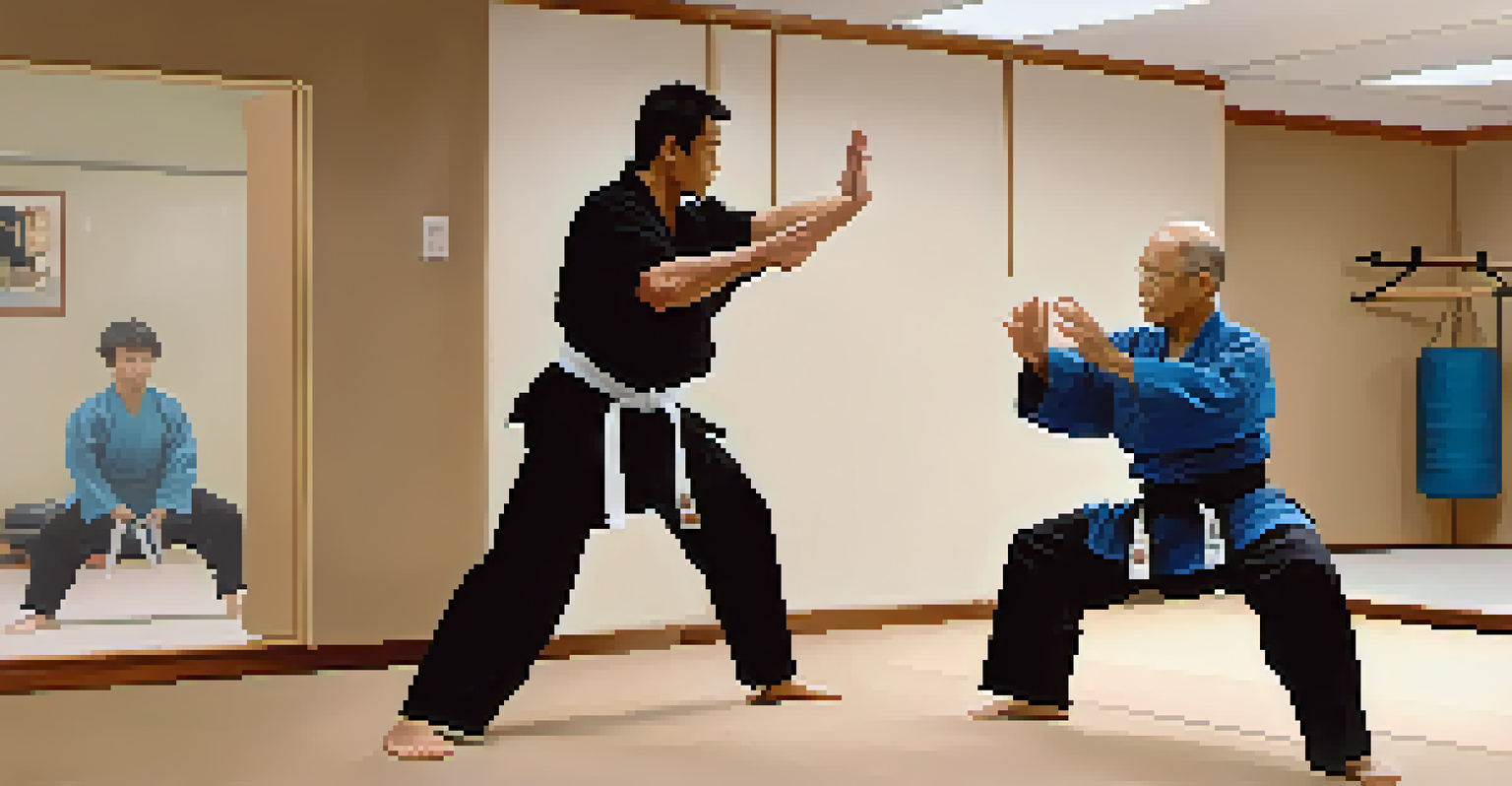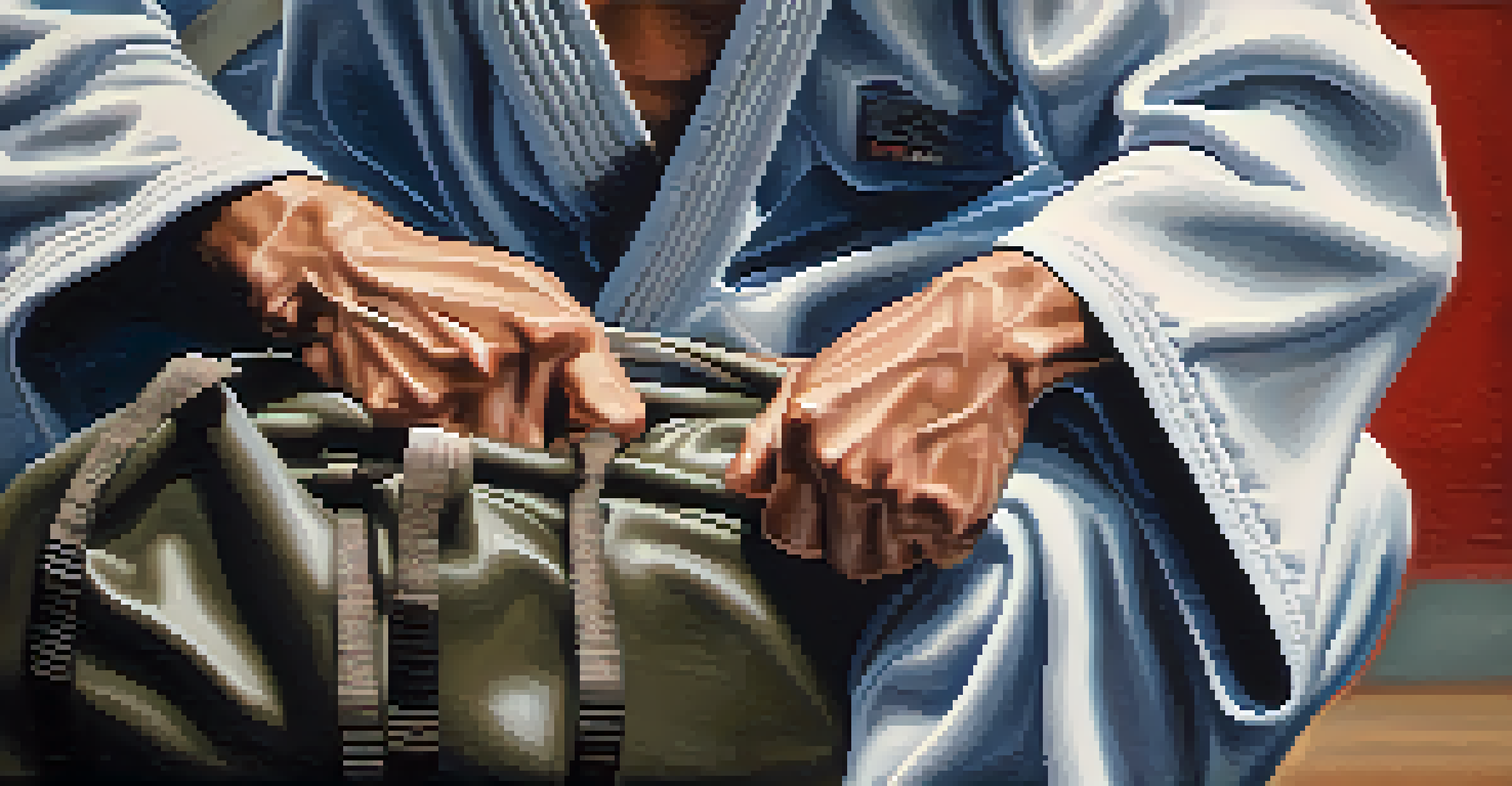Understanding Martial Arts' Role in Physical Rehabilitation

An Introduction to Martial Arts in Rehabilitation
Martial arts, often associated with self-defense and combat, plays a unique role in physical rehabilitation. It combines physical activity with mental discipline, making it an effective tool for recovery. Many rehabilitation programs are now incorporating martial arts to enhance their approaches to healing.
Martial arts is not about fighting; it's about growth and discipline.
The flexibility and adaptability of martial arts mean it can cater to various rehabilitation needs, from post-surgery recovery to chronic pain management. This holistic approach not only focuses on physical strength but also promotes mental well-being, which is crucial in recovery.
As we delve deeper into martial arts for rehabilitation, we will explore its benefits, techniques, and how it can be integrated into a recovery program, showing that healing can indeed be an engaging journey.
Physical Benefits of Martial Arts Training
One of the standout features of martial arts is its ability to improve physical fitness. Through various forms of movement, practitioners develop strength, flexibility, and endurance. These are essential aspects of rehabilitation, as they help patients regain their physical capabilities.

For instance, gentle techniques such as Tai Chi can enhance balance and coordination, particularly beneficial for older adults recovering from injuries. Similarly, more vigorous martial arts like kickboxing can increase cardiovascular health, contributing to overall fitness.
Martial Arts Enhances Physical Recovery
Martial arts training improves physical fitness, strength, and flexibility, making it an effective tool for rehabilitation.
Moreover, the structured nature of martial arts training promotes consistency, which is vital for rehabilitation. Regular practice helps individuals track their progress, motivating them to stick with their recovery plans.
Mental Health and Martial Arts
Beyond physical benefits, martial arts significantly impacts mental health, an often-overlooked aspect of rehabilitation. Engaging in martial arts can help reduce stress, anxiety, and depression, allowing patients to focus on their recovery without mental burdens. The discipline required in martial arts fosters a sense of control and accomplishment.
The mind is everything. What you think you become.
Practitioners learn mindfulness and concentration, which are beneficial during challenging rehabilitation phases. Techniques such as meditation in martial arts can help individuals connect with their bodies, promoting body awareness and reducing the fear of movement.
This mental fortitude gained from martial arts can empower patients, giving them the confidence to tackle their rehabilitation challenges head-on.
Martial Arts Techniques for Rehabilitation
Various martial arts techniques can be specifically adapted for rehabilitation purposes. For example, low-impact practices like Aikido emphasize fluid movements, helping individuals regain mobility and coordination without the risk of injury. These gentle techniques promote gradual strength building.
In contrast, more dynamic styles like Brazilian Jiu-Jitsu focus on body control and grappling, which can be beneficial for those recovering from injuries that affect joint stability. The emphasis on technique over brute strength allows patients to progress at their own pace.
Boosting Mental Health Through Movement
Engaging in martial arts helps reduce stress and anxiety, fostering mental resilience crucial for successful recovery.
Ultimately, the wide array of martial arts styles means there's likely a suitable option for everyone, ensuring that rehabilitation can be both effective and enjoyable.
Integrating Martial Arts into Rehabilitation Programs
Integrating martial arts into traditional rehabilitation programs requires a thoughtful approach. Physical therapists can collaborate with martial arts instructors to develop tailored programs that address individual needs. This synergy ensures that patients receive comprehensive care.
Such integration might involve starting with basic movements and gradually incorporating more complex techniques as patients gain strength and confidence. This not only enhances physical recovery but also keeps patients engaged and motivated.
It's vital for rehabilitation facilities to provide proper training for martial arts instructors, ensuring they understand the specific needs of rehabilitating patients. This collaboration creates an environment that fosters healing through martial arts.
Success Stories: Martial Arts in Action
Numerous success stories illustrate the powerful role martial arts can play in rehabilitation. For instance, individuals recovering from knee surgeries have reported significant improvements in mobility and pain reduction through targeted martial arts training. These stories highlight the positive effects of integrating movement with mental discipline.
Moreover, patients dealing with chronic pain have found relief through practices like Tai Chi, which emphasizes gentle movements and mindfulness. Such experiences provide hope and motivation for others facing similar challenges.
Martial Arts Enhance Rehabilitation
Martial arts offer a unique blend of physical activity and mental discipline, making them an effective tool for various rehabilitation needs.
These narratives not only showcase the effectiveness of martial arts in rehabilitation but also encourage others to explore this alternative approach to healing.
Addressing Misconceptions About Martial Arts
Despite its benefits, there are misconceptions surrounding martial arts, particularly regarding its intensity and competitiveness. Many people believe that martial arts is only for those looking to fight or compete, which can deter individuals seeking rehabilitation. It's essential to clarify that martial arts can be practiced at any intensity level, making it accessible to all.
The focus in rehabilitation is on personal growth and recovery rather than competition. Instructors can tailor classes to meet individual needs, ensuring a safe and supportive environment for those in recovery.

By addressing these misconceptions, we can encourage more individuals to consider martial arts as a viable option for their rehabilitation journey.